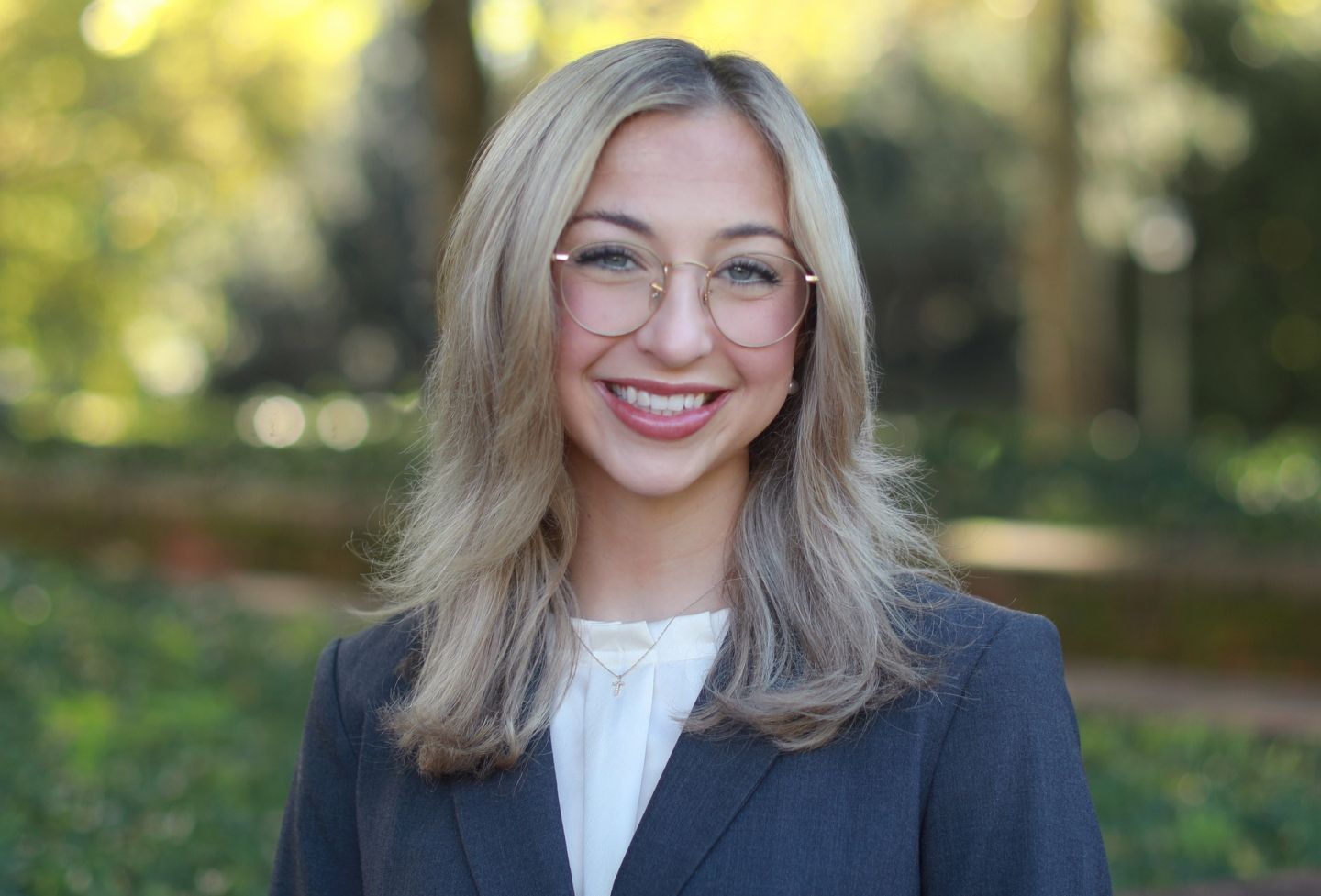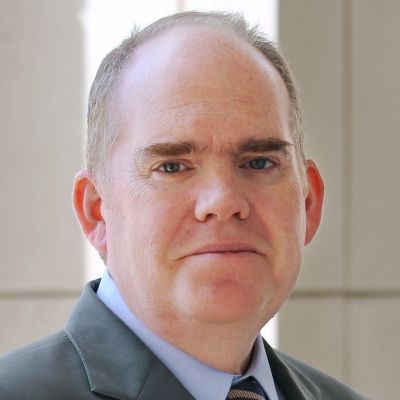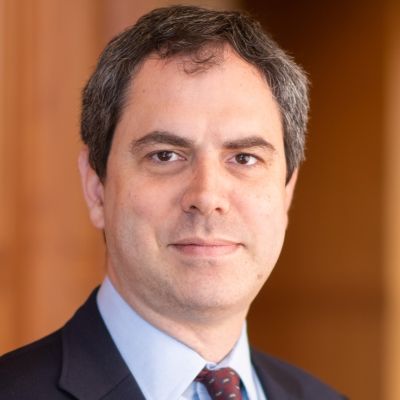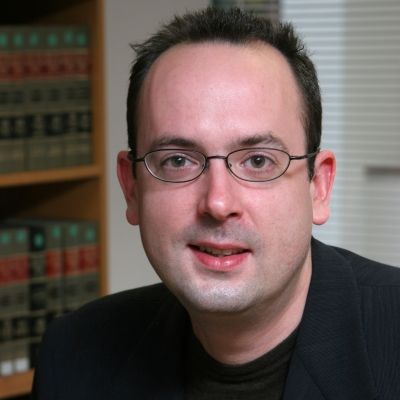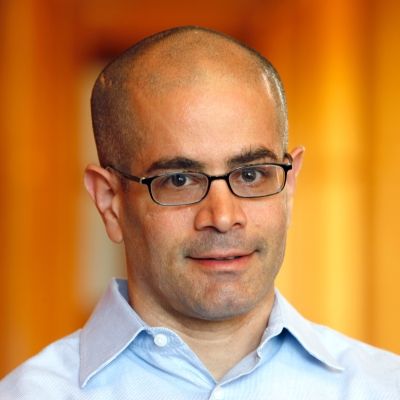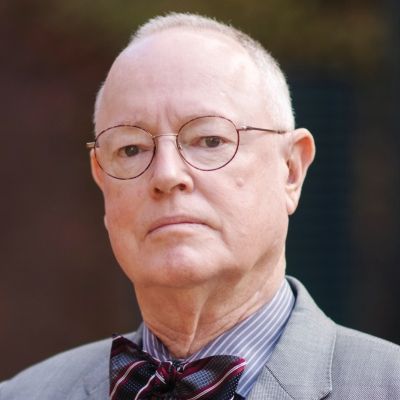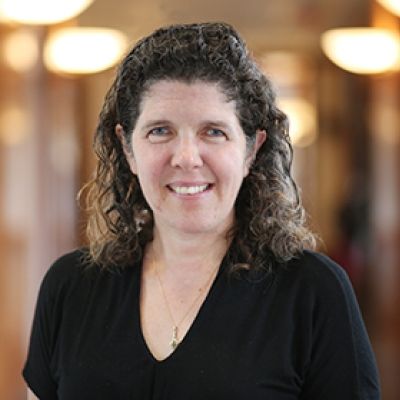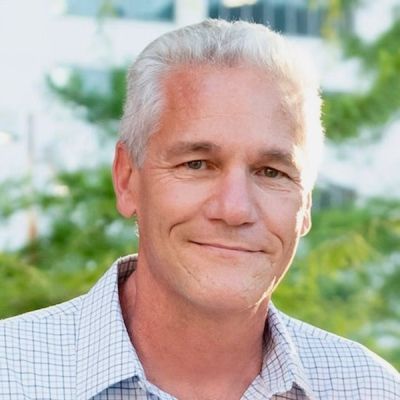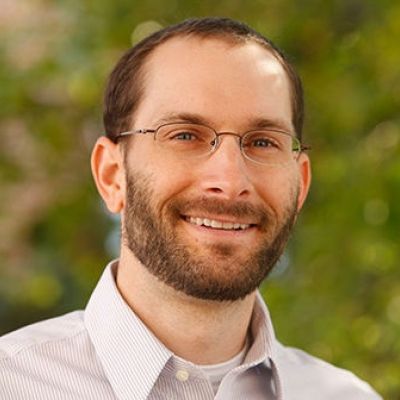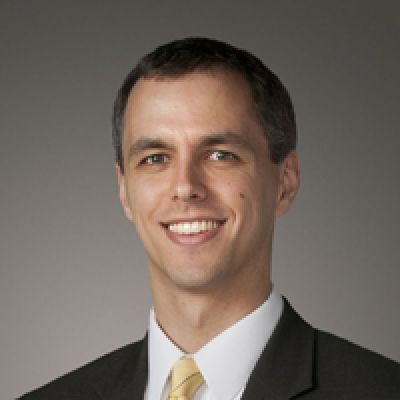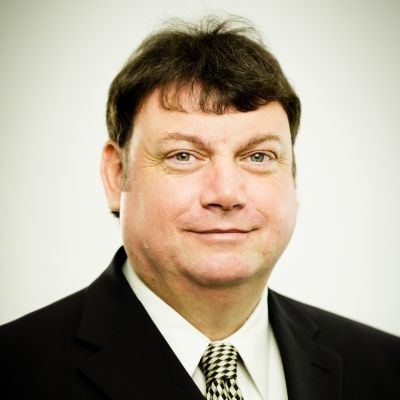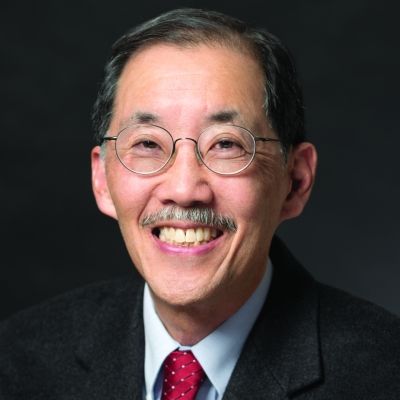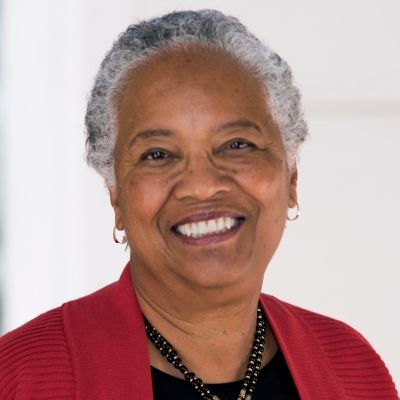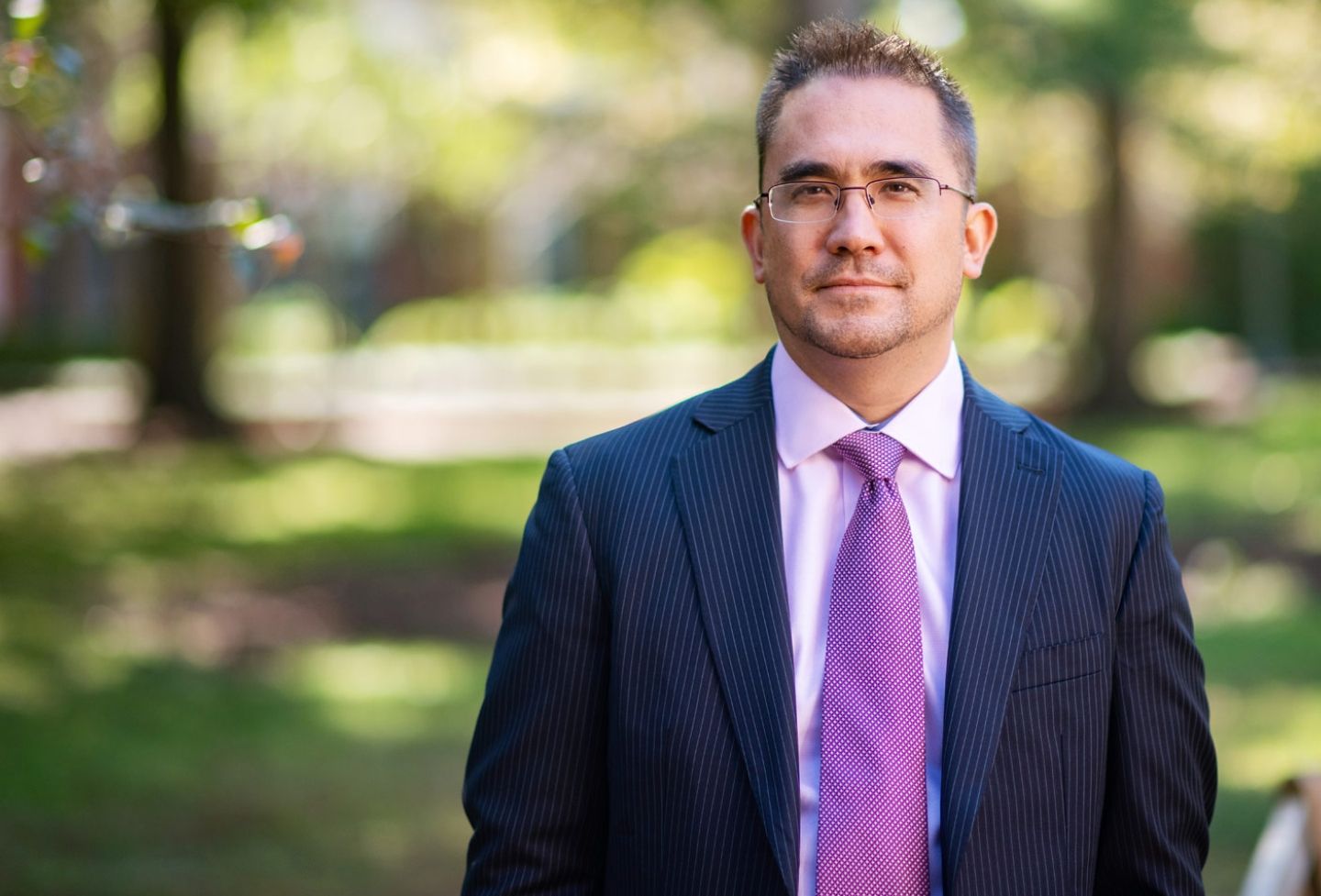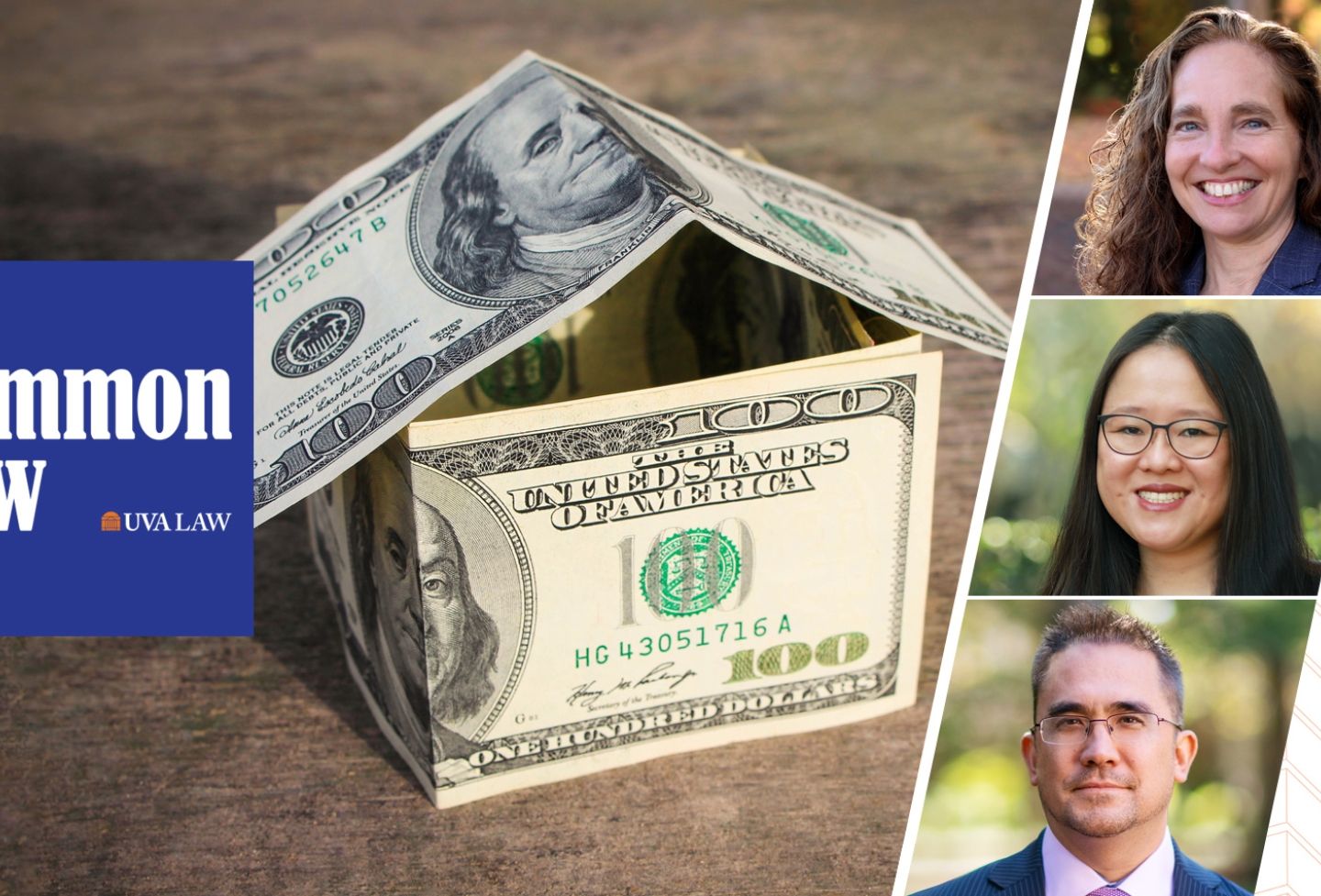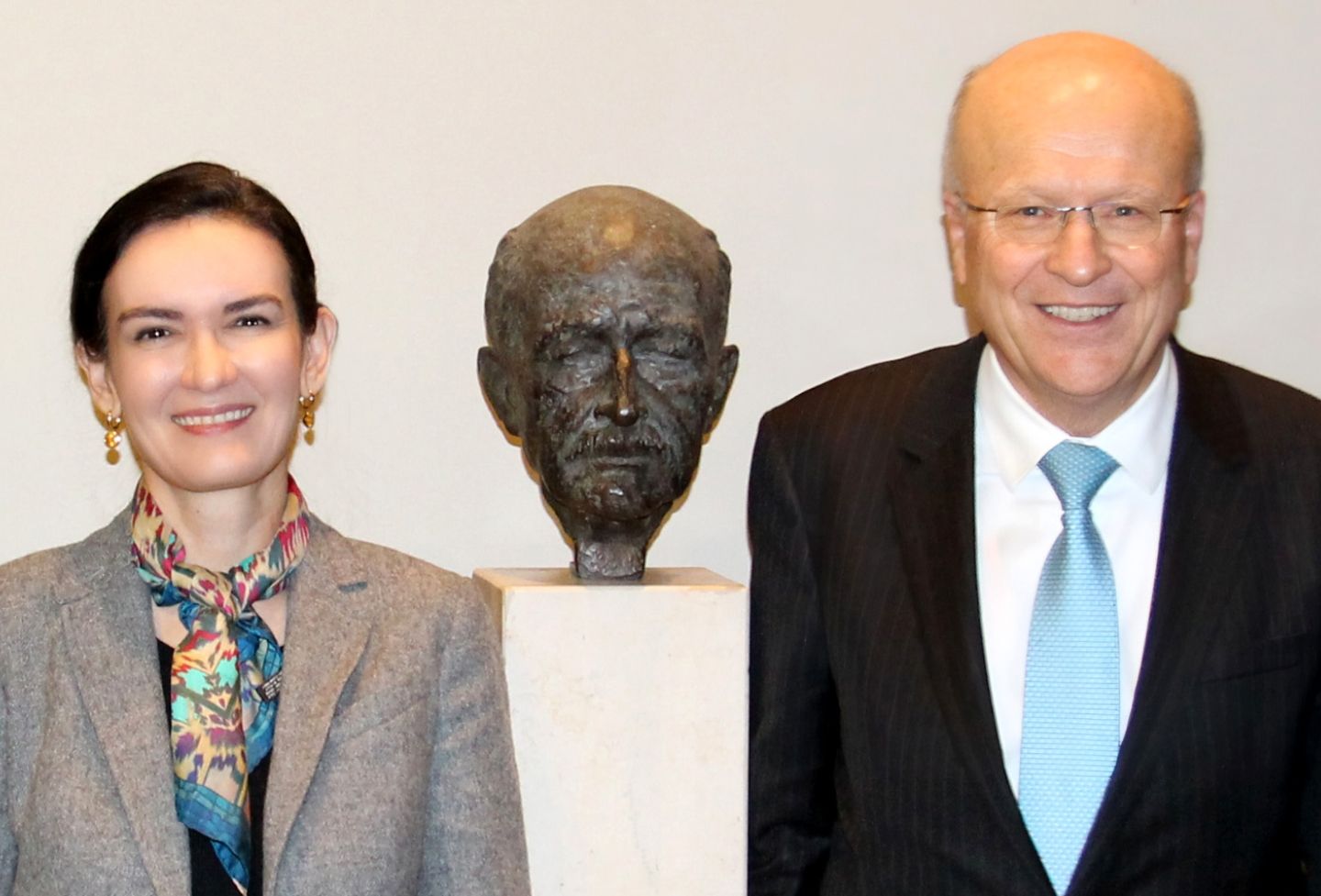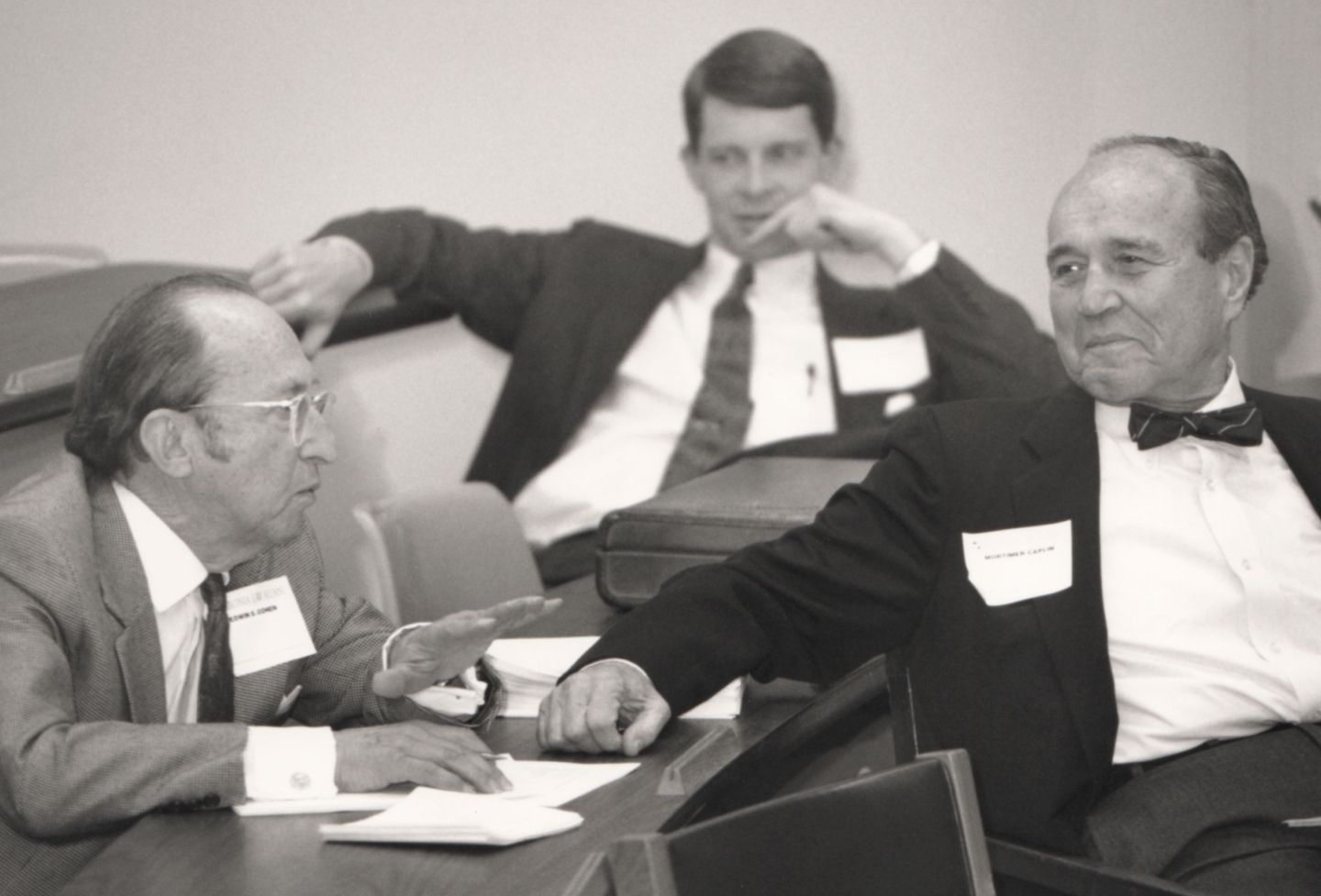About the Program
Consistently ranked one of the top law schools for tax, UVA Law prepares students for tax careers in government, private practice, business and the nonprofit sector. Among the nation’s top scholars, the School’s tax faculty are known for converting students who are fearful of studying tax into fans of the field. They bring experience from Congress, the Treasury Department and private practice. In addition to their scholarly endeavors, the faculty remain engaged with practice organizations such as the ABA Tax Section, the American Law Institute, Congress, the Treasury Department and the IRS.
Virginia offers one of the strongest tax law curricula in the country, including courses in corporate, partnership and international tax; tax policy; taxation of private equity; gratuitous transfers; nonprofits; and employee benefits, among many others. The Law School is home to the Virginia Tax Review, the nation’s leading student-edited tax journal. In addition to their work in the classroom and on the journal, students regularly win top tax prizes, both at home and abroad.
Virginia’s alumni practice tax in a variety of settings. They hold leadership positions in top law and accounting firms, smaller firms specializing in tax, all branches of government and the nonprofit sector. Alumni have joined academia, launched firms focused on tax law, managed the taxes of corporations such as Exxon Mobil and Amazon, served in the U.S. Office of the Legislative Counsel, and held leadership positions at the IRS, including as commissioner.
Faculty, students and alumni also learn about cutting-edge issues in tax from the Virginia Tax Study Group meeting at the Law School, an annual tradition that brings together alumni from practice, government and academia. In the fall, the annual UVA Invitational Tax Conference brings leading tax academics to Grounds to discuss scholarly works in progress. Students are invited to attend both meetings. During the summer, the Law School hosts the Virginia Conference on Federal Taxation, an annual conference that marked its 70th anniversary in 2018.
Liberalism is back on its heels, pushed there by political movements in the United States and Europe and by the critiques of legal scholars and...
Income inequality is a national preoccupation, and the public’s imagination is captured by the astronomical incomes of Valley tech billionaires and...
Over the past twenty-five years, Congress has enacted several major reforms for employer-sponsored retirement plans and individual retirement accounts...
Justin Hopkins
In an era characterized by inequalities of income and influence, political polarization, and the segregation of social spaces, the income tax...
At the inception of a new and potentially transformative type of tax enforcement, this Article reviews the goals underlying the prohibition on state...
The Russian invasion of Ukraine in 2022 provoked the imposition of economic sanctions that are unprecedented in their swiftness, severity, and novelty...
Faculty Director(s)
Ruth Mason
Edwin S. Cohen Distinguished Professor of Law and Taxation
Class of 1941 Research Professor of Law
Director, Virginia Center for Tax Law
Liberalism is back on its heels, pushed there by political movements in the United States and Europe and by the critiques of legal scholars and...
Income inequality is a national preoccupation, and the public’s imagination is captured by the astronomical incomes of Valley tech billionaires and...
Over the past twenty-five years, Congress has enacted several major reforms for employer-sponsored retirement plans and individual retirement accounts...
Justin Hopkins
In an era characterized by inequalities of income and influence, political polarization, and the segregation of social spaces, the income tax...
At the inception of a new and potentially transformative type of tax enforcement, this Article reviews the goals underlying the prohibition on state...
The Russian invasion of Ukraine in 2022 provoked the imposition of economic sanctions that are unprecedented in their swiftness, severity, and novelty...
A division exists between scholars who claim that Congress made only limited delegations to executive officials in the early Republic, and those who...
In this article, Mason reviews the advocate general opinion in the case against Ireland for granting illegal state aid to Apple. Advocate General...
Yehonatan Givati
The Inflation Reduction Act signed by President Biden on August 16, 2022, allocated $80 billion in additional funding for the IRS. While Democrats...
Gregg D. Polsky
Section 1202 of the Internal Revenue Code grants a gain exclusion to certain shareholders who own "qualified small business stock." We describe the...
Income tax law and policy are fundamentally intertwined with private markets—causal effects run in both directions. The vitality of public markets can...
In this article, Mason explains how the OECD's proposed Pillar 2 global minimum tax rules induce cooperation by states, and how the proposal to enact...
In this article, Mason explains why the Commission lost the Fiat state-aid appeal before the Court of Justice of the European Union. She also argues...
More
David Blankfein-Tabachnick
Shifts in academic paradigms are rare. Still, it was not long ago that the values taken to govern the private law were thought to be distinct from the...
More
The use of economic statecraft is at a high-water mark. The United States uses sanctions, tariffs, and import and export controls more than ever...
Pascal Saint-Amans
In this essay, we review criticisms of both the concept of international tax arbitrage and regulatory responses meant to reduce such arbitrage. We...
This article provides historical background that helps explain the agreed proposals among the OECD Inclusive Framework countries on Pillars 1 and 2...
More
National restrictions on trade and immigration are the most salient illustrations of the current protectionist moment, but cities have played their...
Many jurisdictions determine real property taxes based on a combination of current market values and the recent history of market values, introducing...
This article provides a detailed summary of the General Court of the European Union’s judgment in Amazon and analyzes what it means for the future of...
More
Stephen Daly
In this article, the authors analyze the Apple state aid case, concentrating on its implications for state aid analysis and use of the arm’s-length...
More
Ariel Jurow Kleiman
In this article, the authors propose property tax reforms that would allow local governments to raise property tax revenue while protecting vulnerable...
People make mistakes with debt, partly because the chance to buy now and pay later tempts them to do things that are not in their long-term interest...
Michael S. Knoll
This Essay surveys dormant foreign Commerce Clause doctrine to determine what limits it places on state taxation of international income, including...
Michael S. Knoll
In an earlier article, we argued that the Utah Supreme Court failed to follow and correctly apply clear U.S. Supreme Court precedent in Steiner v...
Michael S. Knoll
The taxpayer in Steiner v. Utah State Tax Commission, a 2019 decision by the Utah Supreme Court, has petitioned for certiorari to the U.S. Supreme...
With each economic recession, scholars, pundits, and lawmakers focus on what the Federal government can do to mitigate it. In this Article, I argue...
Leopoldo Parada
This Essay argues that EU taxpayers may challenge digital services taxes as violations of EU law. Specifically, because they exempt all but the very...
Yesterday’s EU General Court decisions in Starbucks and Fiat represent major victories for the Commission and its theory of state aid, notwithstanding...
This article analyzes the pension-reform bill introduced in 2019 by Senator Portman and Senator Cardin. Earlier Portman-Cardin bills, enacted in 1996...
Leopoldo Parada
Member States increasingly use classifications based on company size in their tax laws. Because bigger companies are more likely to be foreign, this...
This Article argues that current methods for identifying illegal tax subsidies trigger the well-known conceptual difficulties of tax-expenditure...
At the peak of the 2008 financial crisis, the Internal Revenue Service (IRS) issued Notice 2008–83 (the Notice), administrative guidance that limited...
In this sixth and final installment in a series of reports on state aid, Mason evaluates the European Commission’s decisions in the recent state aid...
More
This article examines the problem of legislative entrenchment through a particular focus on federal fiscal policy. The conventional academic debate...
In this article, we respond to Professor Zelinsky’s criticism of our arguments regarding the constitutionality of New York’s tax residence rule. We...
Tax law gives relief to “illiquid” taxpayers, those with income or wealth but no cash. This relief results in revenue losses, creates opportunities...
Leopoldo Parada
We argue that the high revenue triggers in proposed digital taxes — including the recent Franco-German proposal for a digital advertising tax — may...
This article describes Wayfair and provides some cautions about what it means for the U.S. states and the rest of the world, especially Europe. It...
Pay arrangements for managers of public corporations typically include substantial amounts of compensation deferred through non-qualified retirement...
This article sets out the case for repealing the $1 million tax cap on executive pay. The cap is easily avoided and, when not avoided, widely...
Michael S. Knoll
Last Term, a sharply divided Supreme Court decided a landmark dormant Commerce Clause case, Comptroller of the Treasury of Maryland v. Wynne. Wynne ...
Michael S. Knoll
In 1998 New York’s highest court upheld a dormant commerce clause challenge to the state’s statutory tax residence rule in Tamagni. This article...
This is Part three in a multi-part Special Report on state aid. It provides detailed analysis and critical commentary on the EU Commission's recent...
More
In this report, the second in a series of reports on EU state aid, Mason evaluates the claims Treasury’ made in its White Paper that recovery in the...
More
In this fourth part in a series of reports on state aid, Mason focuses on the element of “advantage” in EU state aid law, and she criticizes the...
David Blankfein-Tabachnick
This Article rejects a central claim of taxation and private law theory, namely, Kaplow and Shavell’s prominent thesis that egalitarian social goals...
The United States is the only country that taxes its citizens’ worldwide income, even when those citizens live indefinitely abroad. This Article...
Philadelphia has a complex and antiquated tax system that has long been criticized for driving employers and jobs away from Philadelphia by making it...
Anti-basis is the untaxed benefit enjoyed by a taxpayer when a liability or obligation is incurred. In the business context, the untaxed benefit is an...
Michael S. Knoll
On November 12, 2014, the U.S. Supreme Court heard oral argument in Comptroller of the Treasury v. Wynne. The case, which has already been called the...
Michael S. Knoll
This Article discusses Wynne v. Comptroller, a dormant Commerce Clause case against Maryland pending before the Supreme Court. We use economic...
This paper identifies and analyzes a recent trend toward “clean” federal tax legislation. Existing explanations of the tax-legislative process...
The enforcement of tax laws affects the distribution of tax burdens. Many tax enforcement regimes incorporate taxpayer-initiated administrative...
I report evidence from New York City that property assessment caps on small residential properties represent a significant tax benefit that accrues...
Joshua D. Blank
The Foreign Account Tax Compliance Act (FATCA) represents a powerful response by the United States to flagrant offshore tax evasion. Although the new...
Michael S. Knoll
This manuscript responds to Income Tax Discrimination: Still Stuck in a Labyrinth of Impossibility by Professors Michael Graetz and Alvin Warren (121...
Congress uses the income tax to achieve policy goals. States import federal tax policies into their own tax systems when they incorporate by reference...
Early corporate law scholarship argued both that anti-takeover devices are inefficient (they reduce the value of the firm) and that firms adopt...
This article explores the background to, and significance of, the Russian renationalization of the Yukos energy conglomerate through a tax assessment...
The statutory rules regarding the timing and character of income and losses on debt instruments overtax distressed debt investors. Investors that make...
Michael S. Knoll
Prohibitions of tax discrimination have long appeared in constitutions, tax treaties, trade treaties and other sources, but despite their ubiquity...
This paper offers a defense of the idea that taxation to promote religion infringes on taxpayers’ freedom of conscience. Critics have argued that this...
This report examines the case law and statutory history of the terms "partner" and "partnership," including the seminal Supreme Court cases of the...
Scholars and courts recognize that the federal government uses its broad spending power to enlist states in achieving federal goals, thereby expanding...
"Tax discrimination" is an increasingly important legal concept for international trade and cross-border investment. Commentators have observed that...
More
Conventional wisdom, supported by theory and evidence, has it that the franchise tax plays an important role in shaping Delaware corporate law.The...
This essay, a chapter in a book on international investment law and comparative public law forthcoming from Oxford University Press, reviews the...
Governments often deliver social welfare benefits through “tax expenditures,” provisions of the tax code (such as home mortgage deductions) designed...
The United States generally imposes two levels of federal income tax on corporate profits. The first level taxes income to the corporation; the second...
This paper examines the relationship between tax penalties and tax compliance. Conventional accounts, drawing from deterrence theory and norms theory...
The “Option of Adoption Act,” a Georgia law that was introduced by a staunchly anti-abortion Georgia state representative, establishes procedures for...
This comment considers arguments for and against stricter regulation of sovereign wealth funds (SWFs), either by tightening securities laws or...
More
Double taxation of corporate profits distorts the choice of business form, the debt and equity capitalization of companies, and the character and...
The European Court of Justice (ECJ) has come under increasing criticism for overstepping its institutional authority in tax cases by invalidating...
This Article illuminates the interdependence between the structure of Delaware's franchise tax and Delaware's corporate law. It makes three major...
Under the standard the European Court of Justice (ECJ) uses to evaluate tax discrimination cases, a Member State discriminates when it taxes cross...
Daniel I. Halperin
The tax rules governing deferred compensation, codified at section 409A, are harsh and complex. The rules are focused on the least important policy...
Georg W. Kofler
This article considers whether the fundamental freedoms of the EC Treaty encompass an absolute requirement on the Member States to mitigate double...
Brian D. Galle
This Report continues our analysis of Department of Revenue of Kentucky v. Davis, a case argued in the 2007-2008 Supreme Court term. The issue in...
Heinz's wholly owned subsidiary purchased on the market over $131 million worth of Heinz's common shares. A few months later, the subsidiary sold 95%...
The extensive literature on legal transitions has formed a general position in favor of establishing a governmental transition policy; the primary...
Different in more ways than it is possible to easily enumerate, the formation of the United States and the European Union (EU) had a striking...
More
Gregg D. Polsky
Executive pay is currently a topic of significant interest for policymakers, academics, and the popular press. Just weeks ago, in reaction to...
This article discusses tax treaty limitation on benefits (LOB) clauses, with special emphasis on derivative benefits and "equivalent beneficiaries."
More
We argue that for theorists with a post-institutional conception of property, e.g., Rawlsians, there is no principled reason to limit the domain of...
This Article considers the effects of EC law on U.S. tax treaty policy. The discussion is framed by the controversy over the legality of tax treaty...
More
In this article, Professor Yale reviews the contingent liability tax shelter employed by Black & Decker, and critiques the arguments the government...
This report is a comprehensive explanation of the final INDOPCO regulations and corresponding changes to regulations under sections 167 and 446. The...
Normative capitalization would suspend deductions for every expenditure to the extent that it procures a benefit lasting beyond the taxable year in...
David Blankfein-Tabachnick
In the Myth of Ownership: Taxes and Justice (Oxford 2002), Liam Murphy and Thomas Nagel discuss the relationship between tax policy and contemporary...
Chapter 9 of the Bankruptcy Code does not address the issue of whether a bankrupt municipality must increase taxes as a condition for confirming a...
Resident Faculty
Resident Faculty
Tax policy, legislative process and legal ethics
Law and economics, quantitative methods/statistics in the law
Tax law and policy, behavioral economics
Contracts and corporations, nonprofit organizations, bankruptcy
State, international taxation and policy
Tax policy, tax shelters, federal taxation
International law, business and economics
Other Faculty
Tax and budget law and policy, tax reform, legislative processes
Affiliated UVA Faculty
Mary Margaret Frank, Darden School of Business
Recent Research: “What Determines Where Opportunity Knocks? Political Affiliation in the Selection of Opportunity Zones”
Leora Friedberg, Economics
Recent Research: “Same-Sex Marriage Recognition and Taxes: New Evidence About the Impact of Household Taxation”
Justin J. Hopkins, Darden School of Business
Recent Research: “The Charitable Tax Deduction and Civic Engagement”
Jeri K. Seidman, McIntire School of Commerce
Recent Research: “The Effect of Income-Shifting Aggressiveness on Corporate Investment”
In a new paper, University of Virginia School of Law professor Andrew Hayashi documents how federal tax policy can exacerbate local income inequality.
Yale Law professors Anne Alstott and Amy Kapczynski discuss the forthcoming Yale Law Journal article “Building a Law-and-Political-Economy Framework: Beyond the Twentieth-Century Synthesis," written by Jedediah S. Britton-Purdy, David Singh Grewal, Amy Kapczynski and Sabeel K. Rahman. UVA Law professor Ruth Mason, Oxford University professor Tsilly Dagan and other legal scholars comment on the work. This event was held as part of the “Tax Meets Non-Tax” Oxford-Virginia Legal Dialogs workshop series that builds bridges from tax to other kinds of scholarship.
Curriculum
UVA Law students can choose from an extensive selection of courses that cover all major areas of tax law. Students have the flexibility to construct a curriculum of broad-based instruction in the field or to concentrate on a specialized area of interest, such as international tax.
The following is a list of courses offered during 2021-24. Numbers in parentheses indicate which academic year(s) the courses were offered, i.e., 2021-22 is coded (22), 2022-23 is coded (23) and 2023-24 is coded (24). (SC) stands for short course and (YR) stands for yearlong.
Accounting: Understanding and Analyzing Financial Statements (22,23,24)
Cannabis Legalization (SC) (24)
Climate and Debt (24)
Corporate Tax (22,23,24)
Estate Planning: Principles and Practice (22,23,24)
Federal Income Tax (22,23,24)
International Tax Practicum (YR) (22,23,24)
International Taxation (22,23,24)
Nonprofit Organizations (22,23,24)
Nonprofit Organizations: Principles and Practice (22,23,24)
Partnership Tax (22,23,24)
Practical Trust and Estate Administration (22,23,24)
Quantitative Methods (22)
Tax Practice and Procedure Seminar (22,23)
Tax Treaties and Other International Tax Topics (22,23,24)
Taxing Multinationals in a Global Economy (SC) (22)
Federal Income Tax
Tax study begins with a foundational course, Federal Income Taxation. The class introduces the concept of income, income exclusions and exemptions, non-business deductions, deductions for business expenses, basic tax accounting, assignment of income, and capital gains and losses. It situates income tax in government and business, and covers policy issues arising from the incentive and distributional effects of tax law. Because of the importance of the federal income tax, and the role of lawyers in the tax system, tax professors recommend that every student take the basic course at some time during his or her law school career. The course is a prerequisite to all other tax courses.
Other Courses
Students planning careers in tax law should take Corporate Tax, Partnership Tax and International Tax.
In addition to these core courses, the Law School offers many specialized tax courses.
Externships and Experiential Learning
Students have many opportunities to learn about tax outside of the classroom. For example, each year, up to four students may participate in an international tax moot court competition that takes place in Belgium. Students have externed with the IRS Office of Chief Counsel and state tax administrations, and their papers have won tax competitions. See Beyond the Classroom for more information.
Certain property tax schemes designed to give rapidly gentrifying neighborhoods a tax break might be disproportionately benefiting white homebuyers, explains Professor Andrew Hayashi on the latest episode of “Common Law,” a podcast of the University of Virginia School of Law.
Columbia Law School professor Katharina Pistor discusses a chapter from her book “The Code of Capital,” for the Oxford-Virginia Legal Dialogs workshop series that builds bridges from tax to other kinds of scholarship. UVA Law professor Ruth Mason and Oxford University professor Tsilly Dagan comment on Pistor’s work.
Extracurricular Activities
Students interested in tax law have access to a variety of extracurricular activities.
International Tax Moot Court
Each year, up to four students may participate in the International Tax Practicum, a yearlong skills course that uses a mock tax treaty litigation as a lens for studying issues in international tax law. As part of this course, students compete in the International and European Moot Court Competition with teams from all over the world. Students learn to identify legal issues raised by a fact pattern, and they draft briefs for both the government and taxpayer on the issues raised by the moot. If the UVA team’s briefs are strong enough, the team travels to Belgium to compete in the oral phase of the competition against teams from other schools. The weeklong competition features lectures by prominent tax professors and judges as well as a trip to the European Union’s Commission in Brussels.
Since it began competing in 2017, the UVA Law team has been a strong contender each year. In 2018, UVA became the first U.S. team ever to win the competition.
Admission to this course is by application in the spring semester. Professor Ruth Mason is the faculty adviser. More
Oxford-Virginia Legal Dialogs
Tax Meets Non-Tax
In an environment of increasing academic specialization, Oxford-Virginia Legal Dialogs seeks to build bridges across academic disciplines by introducing a new kind of workshop. For each session, a tax scholar will select a non-tax, but legal, work that is prominent in its own field and explain how the work is relevant to the study of taxation. The author of the work will then respond before we open the session to questions and discussion by workshop attendees. More
Virginia Law & Business Review
The Virginia Law & Business Review is one of only a few student-edited business law journals among top law schools. The review regularly holds conferences on current business topics.
Virginia Tax Review
The Virginia Tax Review is the nation’s leading student-edited tax journal. Also one of the oldest journals at the Law School, the journal focuses primarily on issues of federal and international taxation.
Virginia Tax Study Group
The Virginia Tax Study Group is a gathering of alumni from practice, government and academia to discuss the pressing tax problems of the day. Students are invited to attend this lively conference.
Volunteer Income Tax Association (VITA)
The award-winning VITA helps low- and moderate-income clients prepare their tax returns.
Related Student Groups
University of Virginia School of Law Professor Ruth Mason and Koen Lenaerts, president of the Court of Justice of the European Union, helped kick off the newly established Max Planck Hub Fiscal and Social State and its lecture series “The Future of the Fiscal State and the Social State in the European Union.”
Columbia Law School professor Ronald J. Gilson discusses his article, “Value Creation by Business Lawyers: Legal Skills and Asset Pricing,” for the “Tax Meets Non-Tax” Oxford-Virginia Legal Dialogs workshop series that builds bridges from tax to other kinds of scholarship. UVA Law professor Ruth Mason and Oxford’s Tsilly Dagon host the event, and Penn Law professor Michael Knoll comments on Gilson’s work.
3 Paths to Tax Law
The paths that UVA Law alumni have taken to become tax lawyers vary, but they all have in common an alma mater that fosters a love for tax, with courses taught by experts seasoned in the field. Alumni have joined academia, launched firms focused on tax law, managed the taxes of corporations such as Exxon Mobil and Amazon, served in the U.S. Office of the Legislative Counsel, and held leadership positions at the IRS.
Meet three alums who continue the distinguished tradition of Law School representation in this area.
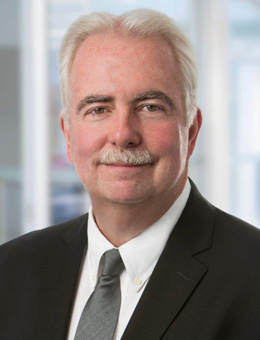 Hal Hicks ’85
Hal Hicks ’85
Partner, Skadden, Arps, Slate, Meagher & Flom
Washington, D.C.
When did you decide to become a tax lawyer?
I went to law school to be a public defender with the goal of saving the world — I fell well short of that mark! I think I made the final switch away from being a public defender in my first semester, second year, when I took my first tax class. I realized then that being a tax lawyer would not be about crunching numbers or filling out tax returns. Instead, it was about complex analysis of facts and law — including statutes, regulations, case law and IRS rulings, etc. My parents had suggested back when I was in college that being a tax lawyer could be good because “there will always be tax law.” Moreover, my then-girlfriend and wife of almost 35 years gently mentioned that tax lawyer might provide a higher standard of living than being a public defender!
Did any of your UVA Law professors influence your decision to go into tax law? If so, who was it and how did they encourage or inspire you?
I had a wide range of tax professors at UVA that certainly affirmed the tax field as an interesting field of practice. These included Hank Gutman, who used the phrase for tax planning that “pigs get fat and hogs get slaughtered.” I still use this phrase often when discussing options with clients. Also, Bill McKee, Tom White, Saul Levmore and Julie Roin. And I could not forget the tax class I took with Mortimer Caplin (a future partner of mine) that really ramped up our enthusiasm for the dynamic nature of tax practice; he also resolved our concerns about tax practice becoming obsolete with the ongoing process of passing the 1986 Tax Act. Mort and Bill and Hank each also created a real desire in us for government service (as they each had) which helped lead me to run the international tax groups at IRS Chief Counsel and at Treasury.
Did any of your classmates at UVA Law join you in tax practice and have you remained in touch with them?
In law classes and on the Tax Review, I studied and worked on publications with many fellow students. Alveno Castilla, Sonny Talley and Peggy Israel, among many others, inspired me to pursue tax law as a profession. We have stayed in touch over the years.
What has been your experience with the Virginia Tax Study Group?
The Virginia Tax Study Group is an excellent tax conference. I am on the boards of several tax conferences and speak (pandemics aside) often. I have been privileged to be a panelist several times at VTSG and to have attended often. It has sometimes conflicted with a conference I help run in Europe, so I have missed some dates for VTSG, but I make it whenever I can. Mort Caplin and Eddie Cohen were huge supporters, so that conference means a great deal to me.
Select Publications
- “Select Cross-Border Tax Issues in Reverse Morris Trust Transactions,” Int’l Tax J., Nov-Dec 2017.
- “Select Corporate Migration and Combination Considerations in an Ever Changing Environment – Update,” Int’l Tax J., July-Aug 2014.
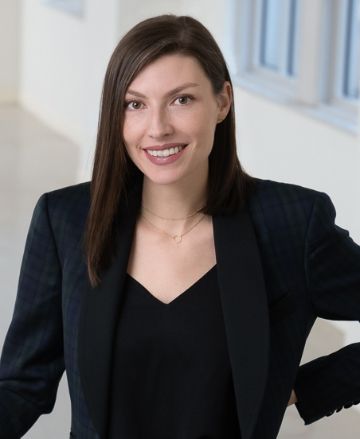
Amanda Leon ’17
U.S. Competent Authority Analyst, Treaty Assistance and Interpretation Team, Internal Revenue Service
Washington, D.C.
When did you decide to become a tax lawyer? Did any of your UVA Law professors influence your decision to go into tax law? If so, who was it and how did they encourage or inspire you?
Hard as I tried, I just could not stay away from tax. Although my pre-law school resume might have fooled some (e.g., CPA and [Volunteer Income Tax Association] volunteer), I did not intend to become a tax lawyer. In fact, I arrived at UVA Law as a 1L announcing my retirement from tax (jokingly after an “illustrious” two-year career as a tax accountant) and very ready to try something new. I took Federal Income Tax that spring solely because my section’s Peer Advisors recommended it as a must-take before graduation, and I figured I might as well take it before I forgot everything I knew about tax. UVA Law and its amazing tax faculty, however, had other plans for me. Just a few weeks into my Federal Income Tax class I was out of retirement discussing the intricacies and logic, or lack thereof, of our tax system with Professor Ruth Mason; by the end of the semester, I was headed to spend my summer working at Caplin & Drysdale as a tax summer associate.
UVA Law’s tax course offerings, which much to my surprise — and gratefully so — were plentiful, solidified my decision to become a tax lawyer and, better yet, prepared me to become one. For example, classes like Professor George Yin’s tax policy seminar taught me to think critically about the why behind tax, Professor Andrew Hayashi’s international tax course taught me how to parse and apply the code, and Professor Mason’s EU tax and international moot court competition classes taught me how to write and advocate in the tax world. Most importantly, however, my time in the tax classroom revealed how passionate all of my professors are about their field and that I would never be bored as a tax lawyer. And here I am, a tax lawyer, much thanks to them.
Did any of your classmates at UVA Law join you in tax practice and have you remained in touch with them?
In addition to providing an invaluable foundation for my future practice (not to mention fostering my inner tax nerd!), UVA Law's vast offering of tax courses provided a unique opportunity to learn and work alongside familiar faces each semester, a mini tax bar of sorts, and make lifelong friendships along the way. While not all of us practice tax now, many of us do and I always look forward to seeing those familiar faces at Virginia Tax Study Group meetings and other conferences or reviving a group text thread when a big case is decided (or even breaking it down on the dance floor at our mutual friends' wedding).
What has been your experience with the Virginia Tax Study Group?
I look forward to attending VTSG meetings every year — and I swear, not just because it is a great excuse to return to Charlottesville! VTSG seems to attract the best and the brightest tax professionals from academia, the government, and private practice year after year, which makes for fascinating panels and discussion. I always leave in awe of both how much I’ve learned and how much more I have to learn. On top of that, in my experience, the VTSG attendees have always been incredibly warm and welcoming to newcomers. I always enjoy catching up with those I’ve met in years past, as well as meeting new people.
Select Publications
- “Book Review: Make Space on Your Bookshelf for Monsenego’s Introduction to Transfer Pricing,” 111 Tax Notes Int’l 1261 (2023) (with H. David Rosenbloom).
- "Mining for Meaning: An Examination of the Legality of Property Rights in Space Resources," 104 Va. L. Rev. 497 (2018).
- "Reconsidering European Court of Justice Jurisprudence on Limitation on Benefits Clauses: Why the U.S. Should Care," 46 TM Int'l J. 83, Bloomberg BNA Tax Mgmt. Int’l J., February 10, 2017.
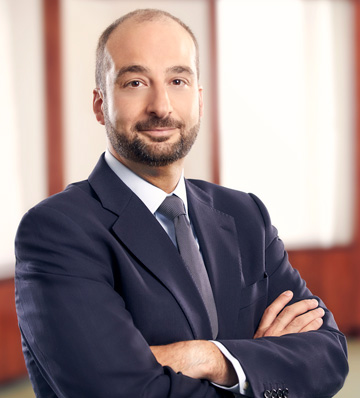 Len Teti ’05
Len Teti ’05
Partner, Cravath, Swaine & Moore
New York
When did you decide to become a tax lawyer?
I enrolled at the Law School without any of the markers you might expect for a future tax lawyer: I had no significant exposure to finance, economics or accounting in my undergraduate education or my early work experience. It was in the spring of my 1L year that I took Federal Income Tax with Professor Paul Stephan. I found it interesting enough to sign up for International Tax the following fall as I was interviewing for 2L summer jobs. Interviewing with tax lawyers through that process and then working as a summer associate in the Tax Department at Cravath helped convince me that I wanted to work as a transactional tax lawyer.
Did any of your UVA Law professors influence your decision to go into tax law? If so, who was it and how did they encourage or inspire you?
Yes, certainly. Professors Mitchell Kane (now at NYU) and Thomas White encouraged me to pursue a tax practice, and I spoke to them at some length about what to expect in the early part of my career. Both were very supportive and helped guide me as I started my first years in practice.
Did any of your classmates at UVA Law join you in tax practice and have you remained in touch with them?
Gavin White ’04 was a year ahead of me in law school and is now a tax partner at Skadden. He and I were in several tax classes together and remain in touch from time to time. Andrew Carlon ’07 was two years behind me and has been in the Cravath Tax Department with me for over a decade. He is one of our senior attorneys and an extremely valuable member of our team.
What has been your experience with the Virginia Tax Study Group?
I try hard to attend these meetings every year. They are always worthwhile and draw a useful mix of practitioners, professors and government lawyers.
Select Publications
- “Unanticipated Costs of Paycheck Protection Program Loans in M&A Transactions,” Harvard Law School Forum on Corporate Governance, June, 17, 2020.
- “US Government Finalizes Rules on Transfers to Partnerships with Related Foreign Partners,” European Tax Blog, February 10, 2020.
- “US Treasury Department Loosens ‘Earnings Stripping’ Rules,” European Tax Blog, November 4, 2019.
- “The World Turned Upside Down: Understanding Corporate Inversions,” Corporate Live Wire 2014 Expert Guide: Tax, September 2014.
The Virginia Tax Study Group has been meeting at the University of Virginia School of Law for more than 30 years. This year, some of the nation’s leading experts in tax law will convene to discuss the global minimum tax proposal and a Supreme Court case that could upend the U.S. tax code.
Professor Richard Pildes of the New York University School of Law discusses his article “Political Fragmentation in Democracies Today.” Professor Wolfgang Schön of the Max Planck Institute for Tax Law and Public Finance provides commentary. UVA Law professor Ruth Mason, Oxford University professor Tsilly Dagan and other legal scholars also discuss the work. This event was held as part of the “Tax Meets Non-Tax” Oxford-Virginia Legal Dialogs workshop series that builds bridges from tax to other kinds of scholarship.
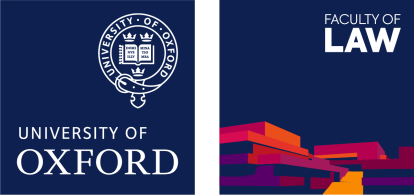
Oxford-Virginia Legal Dialogs
Tax Meets Non-Tax
In an environment of increasing academic specialization, Oxford-Virginia Legal Dialogs seeks to build bridges across academic disciplines by introducing a new kind of workshop. For each session, a tax scholar will select a non-tax, but law-related, work that is prominent in its own field and explain how the work is relevant to the study of taxation. The author of the work will then respond before we open the session to questions and discussion by workshop attendees. More
Annual Events
Faculty, students and alumni learn about cutting-edge issues in tax from a variety of annual events.
Virginia Tax Invitational (Fall)
Every fall, the center invites a small group of tax academics to Charlottesville for an intensive two-day workshop to discuss works-in-progress. Students interested in becoming tax academics should plan to read the papers and attend this event. To make arrangements to attend, please contact the faculty director of the Virginia Center for Tax Law.
Virginia Tax Study Group (Spring)
Every spring, some of the nation's leading experts in tax law convene at the Law School to discuss emerging tax issues. The Virginia Tax Study Group includes scholars, practicing attorneys and government officials who work in tax policy. The event consists of panel presentations and a keynote address at lunch. Students who register are welcome to attend. More
Meeting Information
- The 2024 meeting will take place March 22, 2024 | Keynote Address by Will Morris LL.M. '89, Global Tax Policy Leader at PwC
- 2023 Schedule | Keynote Address by Marty Sullivan, Chief Economist, Tax Notes
- 2019 Schedule | Keynote Address by Michael Graetz ’69, Wilbur H. Friedman Professor of Tax Law and the Columbia Alumni Professor of Tax Law at Columbia Law School, Justus S. Hotchkiss Professor of Law Emeritus and Professional Lecturer at Yale Law School
- 2018 Schedule | Keynote Address by William Gale, Arjay and Frances Fearing Miller Chair in Federal Economic Policy and Senior Fellow at the Brookings Institution, Co-Director, Urban-Brookings Tax Policy Center
- 2017 Schedule | Keynote Address by Nina Olsen, National Taxpayer Advocate, Internal Revenue Service
- 2015 Schedule | Keynote Address by Alan Viard, Resident Scholar, American Enterprise Institute
- 2014 Schedule | Keynote Address by Gene Steuerle, Institute Fellow and Richard B. Fisher Chair, Urban Institute
Virginia Conference on Federal Taxation (Summer)
During the summer, the Law School hosts the Virginia Conference on Federal Taxation, an annual conference that will mark its 75th meeting in 2024.

